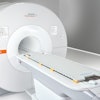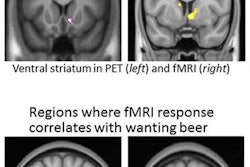Dear AuntMinnie Member,
Medical imaging during pregnancy is generating headlines this week on AuntMinnie.com.
First up is disturbing news from research in Washington state that suggests there could be a link between first-trimester ultrasound and autism in boys with a genetic predisposition to the disease.
Researchers found that boys with a certain type of genetic variation that made them susceptible to autism spectrum disorder had a greater severity of disease if their mothers received ultrasound scans in the first trimester of pregnancy, compared with boys who hadn't undergone first-trimester ultrasound.
The authors theorized that the developing fetal central nervous system could be susceptible to ultrasound in the first trimester, especially given the increasingly powerful ultrasound scanners now in use and animal studies on brain development. They are planning additional studies to explore a possible link. Get the story by clicking here.
While you're in our Ultrasound Community, be sure to check out this article on how elastography can detect pathophysiologic changes in the spleen in cirrhotic patients with blood platelet deficiency. This story and more are available at ultrasound.auntminnie.com.
MRI safe in 1st trimester
On the other hand, a new study published today in the Journal of the American Medical Association found that MRI in the first trimester of pregnancy does not put the fetus at increased risk of stillbirth, birth defects, hearing loss, or childhood cancer.
Researchers from Canada tracked birth records from more than 1.4 million delivered pregnancies and found 1,737 women who had MRI exams in the first trimester. They then tracked stillbirths between this group and the rest of the population who did not receive MRI scans, and followed the development of the children for four years after they were born.
The researchers found no statistically significant difference in health problems between the groups. But the same could not be said for women who received gadolinium contrast during their MRI scans, leading the authors to recommend that gadolinium be avoided during pregnancy. Get the rest of the story by clicking here.
In other news in our MRI Community, learn how researchers from Singapore used diffusion-weighted MRI to solve a mystery in which hundreds of people were sickened with brain infections. That story is available by clicking here, or by going to mri.auntminnie.com.
New FDA DR guidelines
If you're a developer of flat-panel detectors for digital radiography (DR), be sure to visit our Digital X-Ray Community for an article on new guidelines released by the U.S. Food and Drug Administration (FDA). The update is the first since the guidelines were issued in 1999. Learn more by clicking here, or go to xray.auntminnie.com.




















